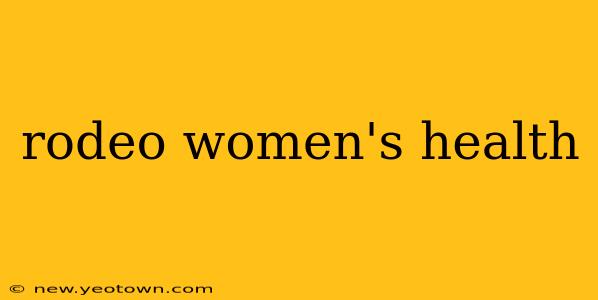The rodeo world, often romanticized for its grit and glory, presents unique health challenges for women participants. From the physical demands of intense athletic competition to the often-overlooked mental and emotional strain, rodeo women face a complex tapestry of health issues. This isn't just about broken bones and bruises; it's about a holistic understanding of the unique health concerns impacting these powerful athletes. Let's delve into the realities of rodeo women's health, exploring the specific issues they face and the strategies for maintaining well-being.
What are the common health concerns for women in rodeo?
This is a multifaceted question, touching upon physical, mental, and emotional well-being. Common physical concerns include injuries like concussions, spinal injuries, and trauma to the extremities (hands, wrists, knees, and ankles). These are inherent risks of the sport, requiring rigorous training, protective equipment, and prompt medical attention. Beyond immediate injuries, long-term health problems like osteoarthritis and chronic pain can develop due to repetitive stress and high-impact movements.
Furthermore, women in rodeo often face societal pressures and expectations that can negatively impact mental health. The demanding travel schedule, financial instability, and intense competition can contribute to stress, anxiety, and even depression. Maintaining a healthy work-life balance, often challenging in this demanding field, further exacerbates these issues.
How does rodeo affect women's reproductive health?
The physical demands of rodeo can significantly impact reproductive health. The jarring impacts and strenuous activities can lead to pelvic floor dysfunction, impacting bladder control and potentially causing pain during intercourse. Hormonal imbalances related to stress and intense training can also affect menstrual cycles and fertility. The constant travel and irregular schedules can make it difficult to maintain consistent healthcare routines, leading to delays in diagnosis and treatment.
What specific injuries are common among female rodeo athletes?
While many injuries overlap between genders, some present disproportionately in women. For example, due to anatomical differences, women may experience higher rates of anterior cruciate ligament (ACL) tears in the knee. The repetitive movements involved in events like barrel racing put significant stress on the knees, making ACL injuries a significant concern. Similarly, the forceful movements in roping and wrestling can lead to shoulder injuries and strains. Concussions, a prevalent issue across all rodeo events, warrant specific attention due to their long-term cognitive effects.
How can female rodeo athletes prioritize their mental health?
Prioritizing mental well-being is as crucial as physical health in rodeo. This includes building a strong support network, which can include fellow athletes, coaches, family, and mental health professionals. Mindfulness techniques, like meditation or yoga, can help manage stress and promote relaxation. Regular engagement in activities outside of rodeo, such as hobbies or social interactions, can provide a healthy balance and prevent burnout. Seeking professional help from therapists or counselors specializing in athlete mental health is also vital. Openly discussing mental health challenges within the rodeo community helps reduce stigma and encourages support.
Are there any specific resources available for women in rodeo regarding health and wellness?
While specific resources dedicated solely to women in rodeo are still developing, many general sports medicine clinics and athletic trainers offer services tailored to the unique needs of rodeo athletes. Several organizations dedicated to rodeo safety and well-being offer resources and information. Connecting with these organizations and professionals is crucial for obtaining guidance and support relevant to specific health concerns. Networking with other female rodeo athletes can create a supportive community and share knowledge and experiences.
Conclusion: A Holistic Approach to Rodeo Women's Health
The journey to success in rodeo for women requires a holistic approach to health and wellness, encompassing physical fitness, injury prevention, mental fortitude, and access to appropriate healthcare. By acknowledging the specific challenges they face and promoting resources and support, we can empower rodeo women to thrive both in the arena and beyond. The future of rodeo women's health relies on a collective commitment to prioritizing well-being and fostering a culture of support and understanding.

